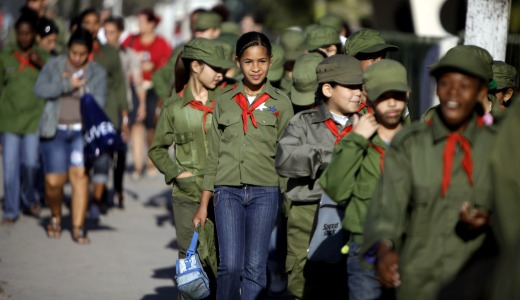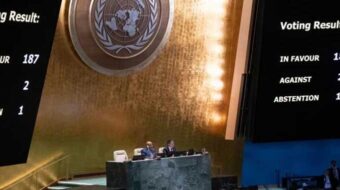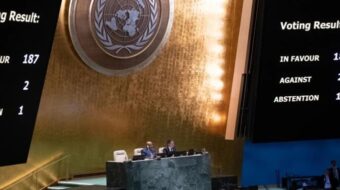
It’s safe to say that no issue in U.S. foreign policy has lingered so long, fundamentally unchanged, as our country’s economic blockade and draconian restrictions on other relations with a very near neighbor, Cuba. President Obama’s recent moves to ease those restrictions, including those announced in mid-January, are a promising start to a long-overdue normalization of U.S. relations with our island neighbor.
Begun in October 1960 – just months after the Cuban people overthrew U.S.-backed dictator Fulgencio Batista – the blockade and other bans have been strengthened several times over the decades.
Besides severely restricting trade with Cuba and imposing penalties on other countries’ trade with the island, successive U.S. administrations have imposed onerous conditions on travel there by U.S. citizens.
Soon after becoming president, Barack Obama signaled a new opening toward Cuba by greatly easing restrictions on travel to Cuba by Cuban Americans, and on their sending remittances to family members in Cuba.
In mid-January the president again moved to ease travel restrictions, this time reopening the way for educational and cultural exchanges and enabling all Americans to send financial support to people in Cuba, as well as expanding the number of U.S. airports that can receive flights from Cuba.
Longtime supporters of normalizing relations are calling the measures a promising step, and urging that full diplomatic and economic relations be reestablished.
“I am extremely gratified to see the series of positive changes to come from this administration, first in 2009 with its new policies for reuniting families and increasing telecommunications and humanitarian aid to Cuba, and today with the announcement of these encouraging policy changes,” said U.S. Rep. Barbara Lee, D-Calif., in a Jan. 14 statement. Lee headed a 2009 Congressional delegation to Cuba, which on its return called for positive changes in relations between the two countries.
Noting that Cuba is the only country in the world where Americans are forbidden to travel, Lee called the blockade “one of the nation’s longest-held foreign policy failures,” and expressed the hope that the administration’s latest announcement was “just one more step” toward normalized relations.
Wayne Smith, who under President Jimmy Carter headed the U.S. Interests Section in Cuba, and is a longtime backer of normal relations, also “strongly endorsed” Obama’s latest announcement and said, “We must build on it if we are to move toward a policy that serves U.S. interests, as present policy clearly does not.”
Smith, now head of the Cuba program at the Center for International Policy (CIP), called for ending the embargo, but noted that the current Congress is unlikely to take that action. He and other participants in a late January CIP conference on Cuba urged the president to act quickly on other measures including removing Cuba from the U.S. list of terrorist states, closing the “provocative” Radio and Television Marti, ending funding of programs to destabilize the Cuban government, and working for “resolution” of the imprisonment of the Cuban Five.
Cuba-born U.S. Rep. Ileana Ros-Lehtinen, R-Fla., is the new chair of the House Committee on Foreign Affairs. She is a strong supporter of the blockade and other anti-Cuba policies. However many Republican as well as Democratic members of Congress, particularly from agricultural states, would like to see trade restrictions eased. Some Republican elected officials have even participated in trade delegations to Cuba.
After Congress in 2000 allowed export of medical and agricultural products, the U.S. became Cuba’s largest supplier of food and agricultural products, with food exports reaching nearly $500 million in 2009. Among U.S. firms doing business with Cuba are such corporate giants as Archer Daniels Midland and Cargill. But, in part because Washington bans U.S. banks or firms from financing credit terms, Cuba has more recently bought these products from other countries including Canada, France, Brazil, Russia and China.
Polls have also consistently shown a significant majority of Americans favor normal relations with Cuba.
For all these reasons, it’s more important than ever to back President Obama as he moves in the direction of normalizing relations. It’s also important to encourage forces like the Congressional Black Caucus and the 120 House members from both parties who co-sponsored a bill in the last Congress to end the travel ban, and to support the many initiatives coming from a broad range of U.S. organizations working to break down the six-decades-old barriers dividing us from our island neighbor.
Photo: Children, dressed as revolutionary guerrilla fighters, walk during ongoing celebrations to mark the triumph of the Revolution in El Cotorro, on the outskirts of Havana, Cuba, Jan. 8, 2011. Although the Cuban revolution is celebrated on Jan. 1, Cubans mark Jan. 8th as the day Fidel Castro entered triumphantly into the capital in 1959. (AP Photo/Javier Galeano)

MOST POPULAR TODAY

Zionist organizations leading campaign to stop ceasefire resolutions in D.C. area


High Court essentially bans demonstrations, freedom of assembly in Deep South

Afghanistan’s socialist years: The promising future killed off by U.S. imperialism

Communist Karol Cariola elected president of Chile’s legislature






Comments